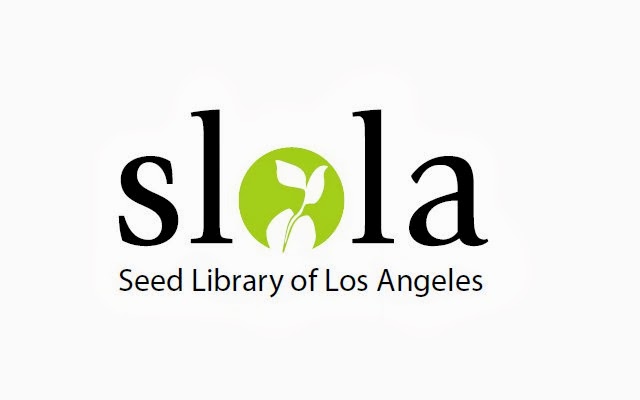 |
| SLOLA Volunteers Check-in Seeds |
A year ago I drew up a list of seeds I thought would be the ones to save – I asked around for others to suggest varieties that I might have missed, but there haven't been a lot of responses.
I was explaining to someone the other day that SLOLA has something like 200 varieties of vegetables in our bank and how I would rather have fewer varieties with larger quantities of each. He suggested that I was postulating the same lack of diversity I decry in the world of seed today.
After thinking about it for a couple of days, I think I have an answer to that accusation: It is better to save a fewer varieties of seed and save them well than to have hundreds of different varieties and save them poorly. I would like SLOLA to save all the seeds that will grow here successfully, but that could easily be more seeds than SLOLA can handle at present.
It is more important that we start where we are (we can't really start somewhere else, can we?) and begin to learn how to save seeds of several major varieties and have them on hand. At present, there aren't that many members who are experienced at growing out to seed. Those who can reliably grow plants out to seed need to apply themselves to growing out the difficult seeds and grow enough out to insure a supply on hand for the rest of our members.
Last year, compiling my list of seeds to save, I was heading east on I-70 through Illinois on into Indiana ending up at Ft. Wayne to celebrate Christmas. I was in the back of a car with my little Netbook and using a Blackberry to be online. This year, I'm at home and surrounded by seed catalogs, including the two most often cited as 'veggie porn' catalogs (Seed Savers' Exchange and Baker Creek Heirlooms) and was able to use their listings to create the following list of seeds to save.
I'd like to hear from everyone who reads this and has suggestions for varieties of veggies to save. The Seed Savers Of Los Angeles need a list of seeds to save – a 'target' for us to shoot for. Email us via the blog or bring your list to any SLOLA meeting – I’ll be willing to add your suggestions to my list. Let's see if we can double this in the coming year!
Here are my choices:
Artichokes
Green Globe
Violetto
Beans
Aquadulce (Fava)
Broad Windsor (Fava)
Cannelini Bush Bean (Dry/Bush)
Christmas (Lima/Climbing)
Dr. Pineschi's Grandfather Bean (Vigna unguiculata)
Envy (Soybean)
Golden Wax Bean (Wax/Bush)
Henderson (Lima/Bush)
Hutterite Soup
Pencil Pod (Wax/Bush)
Royal Burgundy Bean (Purple/Early)
Scarlet Runner (Phaseolus coccineus)
Beets
Albino
Albino
Bull's Blood
Crosby's Egyptian
Burpee's Golden Beet
Chioggia Beet
Detroit Dark Red
Yellow Cylindrical
Broccoli
DiCicco
Nutribud
Brussels Sprouts
Long Island Improved
Cabbage
Copenhagen Market Cabbage
Early Jersey Wakefield
Glory of Enkhuizen
Mammoth Red Rock
Perfection Drumhead Savoy
Premium Late Flat Dutch
Winningstadt
Carrot
Scarlet Nantes
Chantenay Red Core
Danvers Half Long
White Belgian
Cauliflower
Early Snowball
Chard
Five Color Silverbeet Chard (AKA Rainbow Chard)
Fordhook Giant
Celery and Celeriac
Giant Prague (Celeriac)
Utah Tall (Celery)
Corn
Country Gentleman Corn
Golden Bantam CornStowells Evergreen
Cucumber
Armenian
Eggplant
(You know, I don't really LIKE eggplant - but I'm open to listing suggestions from those of you who do!)
Grains Etc... (The library is not saving any of these seeds, but it is important to keep these in mind for the near future - I've already started to grow out the Federation Wheat trying to get a supply of seed on hand, there'll be another blog post about this one soon.)
Flax
Quinoa, Shelly 25 Black
Sesame, Light Seeded
Wheat, Federation 126
Kale
Blue Curled Scotch
Lacinato
Leek
Blue Solaise
Carentan
King Richard
Lettuce
Black Seeded Simpson
Brune d'Hiver
Cimmaron
Drunken Woman Frizzy Head Lettuce
Tango Lettuce
Merlot Lettuce
Merveille des Quatre Saison Lettuce
Parris Island Cos Lettuce
Red Romaine
Rouge d'Hiver
Rouge Grenobloise
Summertime
Tango
Tom Thumb
Webbs Wonderful
Yugoslavian Red
Melons
Charentais
Green Nutmeg
Hale's Best
Metki White Serpent (cucumber)
Tigger
Okra
Burgundy
Clemson Spineless
Star of David
Onion
Red of Florence
Parsnip
Harris Model
Peas
Alaska
Lincoln
Little Marvel
Tall Telephone
Oregon Sugar Pod
Sugar Snap
Pepper
Anaheim
Corno di Toro
Fish
Italian Pepperoncini
Jalapeno Early
Jimmy Nardello Italian
Red Marconi
Squash – Summer
Lebanese White Bush Marrow
Zucchini – Lungo Bianco
Squash - Winter
Black Futsu
Chersonskaya
Delicata
Marina di Chioggia
Queensland Blue Squash
Sweet Meat
Tomato
Amish Paste
Big Rainbow
Black Cherry
Black From Tula
Black Icicle
Cherokee Purple Copia
Cream Sausage
Federle
Flammé
Orange Banana
Orange Icicle
Roman Candle
Rutgers
San Marzano
San Remo
Striped Roman
Thessaloniki
Wapsipinicon Peach
Turnip
Purple Top White Globe
That totals 113, this year. Maybe we'll top 200 next year! Let us know which ones are missing and help us to find those really good varieties to save!
david


